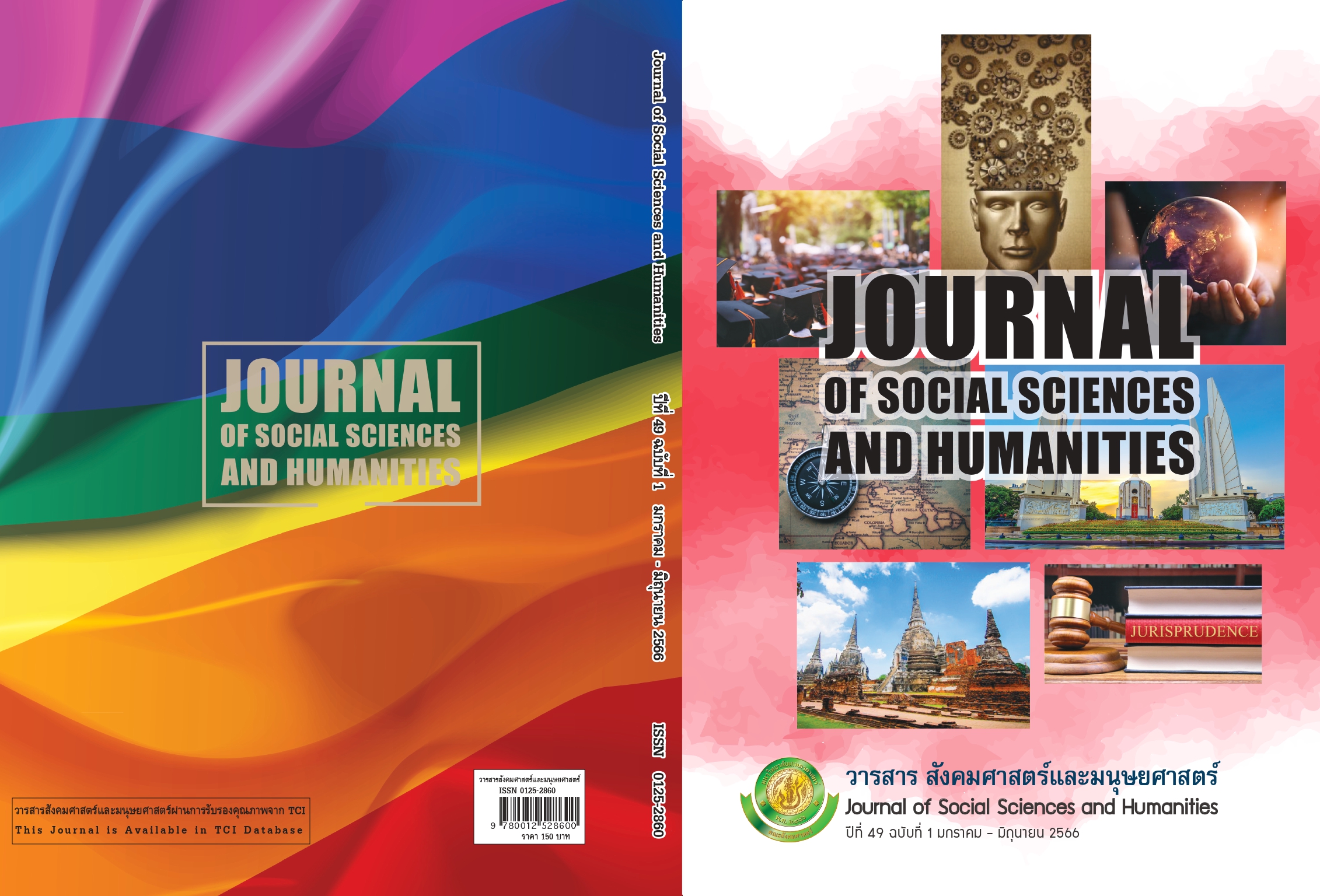การปรับตัว กับสุขภาวะทางจิตใจของนิสิตปริญญาตรีชั้นปีที่ 1 มหาวิทยาลัยเกษตรศาสตร์ วิทยาเขตบางเขน
Main Article Content
บทคัดย่อ
การวิจัยครั้งนี้มีจุดประสงค์ เพื่อศึกษาระดับการปรับตัวกับสุขภาวะทางจิตใจของนิสิตปริญญาตรีชั้นปีที่ 1 มหาวิทยาลัยเกษตรศาสตร์ วิทยาเขตบางเขน กลุ่มตัวอย่างที่ใช้ในระเบียบวิธีวิจัยเชิงพรรณนา คือ นิสิตปริญญาตรี ชั้นปีที่ 1 มหาวิทยาลัยเกษตรศาสตร์ วิทยาเขตบางเขน จำนวน 382 คน เก็บรวบรวมข้อมูลโดยใช้แบบสอบถาม สถิติที่ใช้ในการวิเคราะห์ข้อมูลคือ ค่าร้อยละ ค่าเฉลี่ย ส่วนเบี่ยงเบนมาตรฐาน, t-test, F-test, การเปรียบเทียบรายคู่โดยวิธี LSD, ค่าสัมประสิทธิ์สหสัมพันธ์ของเพียร์สัน ผลการวิจัยพบว่า 1) นิสิตมีการปรับตัว และสุขภาวะทางจิตใจอยู่ในระดับสูง 2) ปัจจัยส่วนบุคคลที่แตกต่างกันจะมีระดับสุขภาวะทางจิตใจที่แตกต่างกันที่นัยสำคัญทางสถิติที่ ระดับ 0.01 และ 0.05 3) การปรับตัวมีความสัมพันธ์ทางบวกกับสุขภาวะทางจิตใจที่นัยสำคัญทางสถิติที่ระดับ 0.01
Article Details

อนุญาตภายใต้เงื่อนไข Creative Commons Attribution-NonCommercial-NoDerivatives 4.0 International License.
เอกสารอ้างอิง
กฤษวรรณ หน้องมา. (2554). ความสัมพันธ์ระหว่างสุขภาวะทางจิต คุณภาพชีวิตในการทำงานและการรับรู้ความสำเร็จในอาชีพ: กรณีศึกษาบริษัทข้ามชาติแห่งหนึ่ง. [วิทยานิพนธ์ปริญญาโท, มหาวิทยาลัยธรรมศาสตร์].
จุฑารัตน์ สถิรปัญญา และวิทยา เหมพันธ์. (2556). ความเครียดของนักศึกษามหาวิทยาลัย. วารสารศิลปศาสตร์ มหาวิทยาลัยแม่โจ้, 1(1), 42-58.
ทวีชัย เชสูงเนินและปิยธิดา คูหิรัญญรัตน์. (2554). ความอยู่ดีมีสุขและปัจจัยที่เกี่ยวข้องของผู้สูงอายุที่เป็นสมาชิกสมาคมข้าราชการ บำเหน็จ บำนาญและผู้สูงอายุ จังหวัดขอนแก่น. Srinagarind Med J, 26, 25-46.
ประภาวดี เหล่าพูนสุข. (2539). ปัญหาการปรับตัวและสุขภาพจิตของนิสิตชั้นปีที่ 1 มหาวิทยาลัยบูรพา จังหวัดชลบุรี. [วิทยานิพนธ์ปริญญาโท, มหาวิทยาลัยธรรมศาสตร์].
เพลินทิพย์ โกเมศโสภาและชัชพงศ์ ตั้งมณี. (2534). พฤติกรรมการใช้เวลาและรูปแบบการใช้จ่ายของนิสิตนักศึกษาในเขตกรุงเทพมหานคร. (รายงานผลการวิจัย). จุฬาลงกรณ์มหาวิทยาลัย.
Baker, R. W., and B, Siryk. (1984). Measuring adjustment to college. Journal of Counseling Psychology, 31, 179-189.
Baker, R. W., and B, Siryk. (1989). Student Adaptation to College Questionnaire (SACQ). Manual. Western Psychological Services.
Bowman. (2010). The Development of Psychological Well-Being among First-Year College Students. Journal of College Student Development, 51(2), 180-200.
Bronfenbrenner U. (1984). The ecology of human development: Experiments by nature and design. University Press.
Discrimination, and Eudaimonic Well-being: Do the Challenges of Minority Life Hone Purpose and Growth. Journal of Health and Social Behavior, 44(3), 275-291.
Dwyer, A. L., & Cummings, A. L. (2001). Stress, self-efficacy, social support, and coping strategies in university students. Canadian Journal of Counselling, 35(3), 208-220.
Elias, Ping and Abdulla. (2011). Stress and Academic Achievement among Undergraduate Student in Universiti Putra Malaysia. Social and Behavioral Science, 29, 656-655.
Bowman, N.A. (2008). Dissonance and resolution: The non-linear effects of diversity courses on well- being and orientations toward diversity. Manuscript submitted for publication.
Felicia A Huppert. (2009). Psychological Well-being: Evidence Regarding its Cause and Consequence. https://iaap-journals.onlinelibrary.wiley.com/doi/10.1111/j.1758-0854.2009.
x.
Feldinald and Feldinald, (2006). The Relationship between Social Support, Social Adjustment, Academic Adjustment, and Academic Performance among College Students in Tanzania. https://1library.net/document/y8p93l5z-relationship-adjustment-academic-adjustment-academic-performance-students-tanzania.html.
Fernandez, A. R. (2009). The relationship between physical self-concept and psychological well-being of young people. [n.p.].
Grayson, J. (2003). The consequences of early adjustment to university. Higher Education, 46(4), 411-429. http://www.sciencedailyscon/releases/200902/090203081618.html.
Jasraj Kaur. (2012). Adjustment of College Students in Relation to Their Well Being. International Journal of Research In Education Methodology Council For Innovative Research, 1(2), 103-126.
Jean-Trudel, Guay and Marchand. (2009). The relationship between social Support, psychological stress and the risk of developing anxiety disorders in men and women: results of a national study. Canadian journal of Public health. Revue canadienne de santé publique, 100(2), 48-52.
Kariv, D., & Heiman, T. (2005). Task-oriented versus emotion-oriented coping strategies: The case of college students. College Student Journal, 39(1), 72-85.
Lawton, M.P. (1983). Environment and Other Determinants of Well-Being in Older People. https://doi.org/10.1093/geront/23.4.349.
Ludban, M, and P. N. Gitimu. (2015). Psychological Well-being of College Students. https://www.kon.org/urc/urc_research_journal14.html.
Luthans, Youssef and Avolio. (2007). Psychological Capital: Developing the Human Competitive Edge. https://www.researchgate.net/publication/287703316_Psychological_Capital_Developing_the_Human_Competitive_Edge.
Matud, M. P., M. López-Curbelo, and D. Fortes. (2019). Gender and Psychological Well-Being. International Journal of Environmental Research and Public Health, 16, 1-11.
Milkie M. A., et al., (2008). How adult children influence older parents’ mental health: Integrating stress-process and life-course perspectives. https://doi:10.1177/019027250807100109.
Molinero, Zayas, González and Guil. (2018). Optimism and Resilience Among University Students. International Journal of Developmental and Educational Psychology, 1(1), 147-154, 2018.
Poudel., et al., (2020). Perceived social support and psychological Well-being among Nepalese adolescents: the mediating role of self-esteem. https://doi.org/10.1186/s40359-020-00409-1.
Punia and Malviya. (2015). Psychological Well Being of First Year College Students. Indian Journal of Educational Studies: An Interdisciplinary Journal, 2(1), 2349-6908.
Ryff, C. D. (1995). The structure of psychological well-being revisited. Journal Of Personality and Social Psychology, 69(4), 719-727.
Semmer., et al., (2008). The Emotional Meaning of Instrumental Social Support. International Journal of Stress Management, 15(3), 235-251.
Taro Yamane. (1973). Statistics: An Introductory Analysis. Harper and Row Publications.
Thineerat Thavorn, et al., (2018). Correlated Factors of Psychological Well-Being among High School Students. Journal of Nurs Sci, 36(3), 59-70.
Thomas, Liu and Umberson. (2017). Family Relationships and Well-Being. https://www.ncbi.nlm.nih.gov/pmc/articles/PMC5954612/.
Tinto, V. (1975). Dropout from higher education: “A theoretical synthesis of recent research.” Review of Educational Research, 45, 89-125.
Tinto, V. (1993). Leaving College: Rethinking the causes and cures of Student attrition (2nd ed). University of Chicago Press.
Umberson D., Crosnoe R., & Reczek C (2010). Social relationships and health behavior across the life course. Annual Review of Sociology, 36(36), 139-157.
Vo Van Viet. (2021). Student’s adjustment to university and its relation to gender, residence and family factors. Kasetsart Journal of Social Sciences, 42, 81-88.
Wilcox, P., et al., (2005). It was nothing to do with the University, it was just the people: The role of social support in the first-year experience of higher education. Studies in Higher Education, 30, 707-722.
Wong. (2012) Negative Thinking Versus Positive Thinking in a Singaporean Student Sample : Relationship with Psychological Well being and Psychological Maladjustment. Learning and Individual Difference, 22, 76-82.
Yau, et al., (2012) Adjusting to University; the Hong Kong Experience. Journal of Higher Education Policy and Management, 34(1), 15-27.
Zeller, W. J., & R, Mosier. (1993). “Culture shock and the first-year experience.” Journal of College Student Development, 23(2), 19-2.


